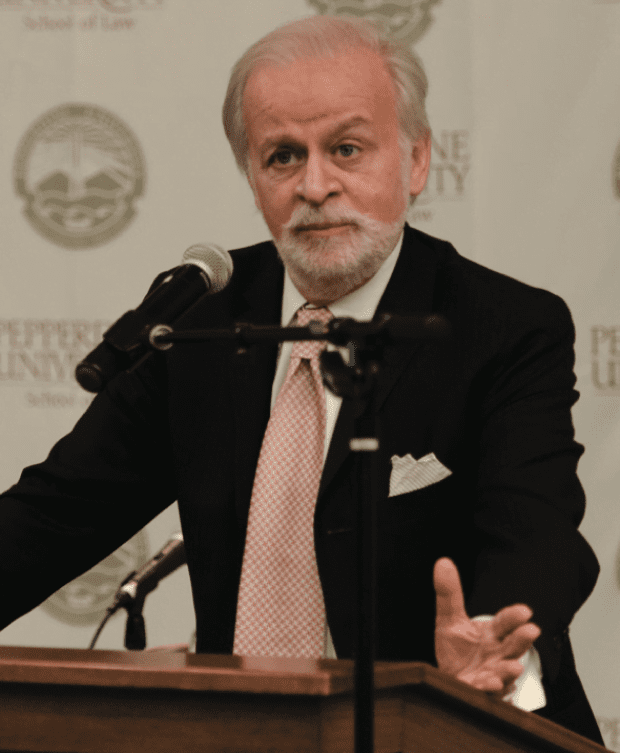Pepperdine University law students heard from ex-CIA General Counsel John Rizzo on Friday, the man who helped create and implement the full spectrum of aggressive counterterrorism operations against Al Qaeda following 9/11, and revisited the ethics surrounding the agency’s controversial interrogation methods such as waterboarding.
Attendees also learned, to much surprise, that the U.S. Senate never requested an interview with senior ranking CIA officials or its leading attorney while the new methods were first being used.
The all-day symposium tackled the separation-of-powers system in post-9/11 America, its history and its future in the context of national security. The Pepperdine Law Review hosted the event, which was attended by esteemed professors from law schools nationwide who participated on several panels.
During his luncheon keynote address and question-and-answer session, Rizzo addressed his role as legal counsel to CIA leadership and the need to outline to the Justice Department the exact nature of each “enhanced interrogation technique.” Some critics consider some of the more graphic practices, like waterboarding, torture.
“I’m fairly sure what the first paragraph of my obituary will say,” Rizzo told the audience, conceding that he believes waterboarding was not torture then and still is not today. He added that the CIA interrogation report should be declassified.
“I’m comfortable with it to this day,” said Rizzo, who has a new book titled “Company Man: Thirty Years of Controversy and Crisis in the CIA.”
Amid pressure to prevent future terrorist attacks, the CIA introduced new interrogation techniques shortly after 9/11 and after the first high-level Al-Qaeda member, Abu Zabaydah, was captured.
According to Rizzo, new measures were needed to extract time-sensitive information other than through regular question-and-answer interrogation. Waterboarding, the act of holding down a prisoner and pouring water over a cloth covering their face, causes individuals to experience the sensation of drowning.
But many, including California Sen. Dianne Feinstein, have condemned the tactics overseen and defended by Rizzo. She believes such methods might have violated the Constitution.
The tactics are “a stain on our history that must never again be allowed to happen,” Feinstein said earlier this month.
“This is not what Americans do,” she said. President Obama banned waterboarding and other controversial techniques in 2009.
When asked if the same information could have been obtained from detainees through other physical and psychological interrogation methods, Rizzo said, “Maybe, but how long would that have taken? You have to look at every given situation and what your conscience can bare. Can we do this legally that will protect the country and the American people?”
On the top of National Security Agency (NSA) leaks, Rizzo said he hesitates to go as far as calling Edward Snowden a whistleblower or a traitor, but that he will eventually come back to the U.S. to answer for himself.
“I think he’s an inglorious young guy who took it upon himself to decide for himself and to use the benefit of his years of wisdom,” Rizzo said. “I submit to you, it’s not an appropriate legal role for anyone to undertake, to sit in a shack in Hawaii and decide to expose the NSA spies.”
Shelby Doyle, editor for the Pepperdine Law Review, said she felt it was admirable of Rizzo to call for the release of the CIA interrogation report and more transparency in the agency. She was also shocked the Senate Intelligence Committee never requested an interview with Rizzo when the interrogations began.
“I want to be as careful as him in my decisions,” she said about her hopes of practicing law.
Pepperdine Associate Law Professor Gregory McNeal said Rizzo’s visit to Malibu showcased the school’s intellectual prominence.
“The students … learn that when you serve in the court you regularly face challenging legal and ethical questions,” he said.

